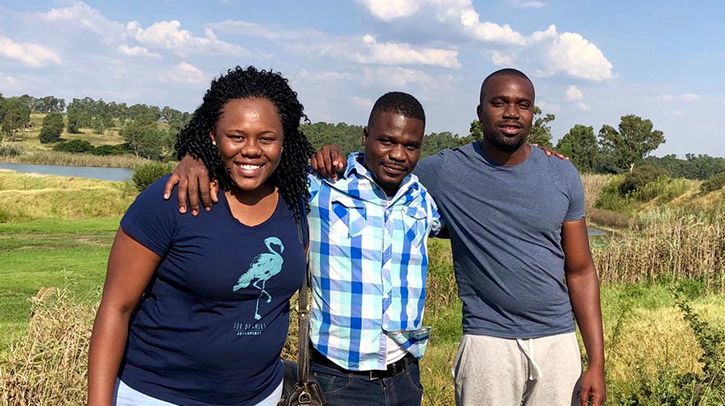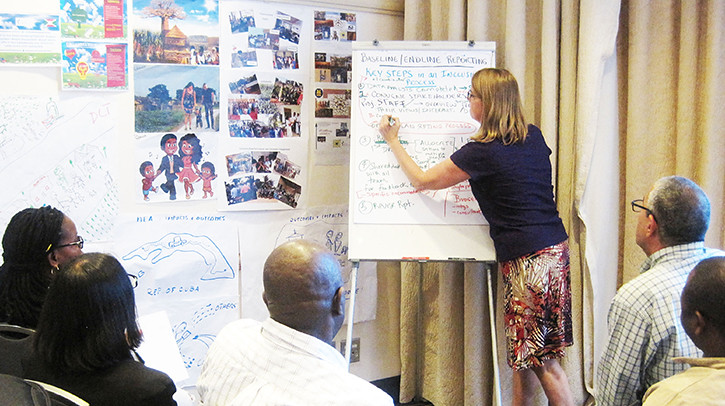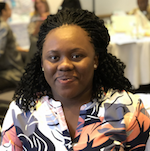Monitoring, Evaluating, and Learning (MEL) | Community of Practice Through the Eyes of a Partner

How do we assess project impact? How do we use data to improve projects and share results? These questions and more were tackled by an enthusiastic group of Episcopal Relief & Development partner staff – during their Community of Practice workshop and at ongoing bimonthly video conference meetings.
In these partner-led groups, colleagues exchange stories and share learnings, best practices, challenges and solutions to strengthen their respective programs. From March 18-22, Episcopal Relief & Development hosted a week-long Monitoring, Evaluating and Learning (MEL) technical workshop for fourteen development practitioners from thirteen countries in Johannesburg, South Africa to further strengthen MEL capacities and collaborative efforts.
In this blog Rudo Ratsakatika, a founding member of the MEL Community of Practice and current co-chair, as well a respected leader in her community, shares her experience and excitement about the face-to-face encounter.
In March this year, I had the honor to meet with other development practitioners in Johannesburg to share how we – as a Community of Practice (CoP) – use different monitoring and evaluation tools and processes for learning, and transformation in the communities and organizations where we work. For me, it’s in the Diocese of Matabeleland in Zimbabwe, where we focus on climate-smart agriculture, health, and economic well-being.
This global CoP was born from an idea that several of us staff members from various partner countries had during Episcopal Relief & Development’s 2017 Charting Pathways workshop in Tanzania. We wanted a way to keep learning from each other’s experiences. We started by chatting through WhatsApp and then began meeting monthly on video conference calls, facilitated in conjunction with Episcopal Relief & Development staff. During these meetings we shared experiences such as designing baselines, using mobile devices to collect data, engaging communities using participatory activities such as mapping and seasonal calendars and assessing program impact. The MEL Workshop in Johannesburg built on the energy and ideas of our CoP.
 Dawn Murdock, Director of Strategic Learning & Program Resources, outlines the importance of baseline and endline reporting.
Dawn Murdock, Director of Strategic Learning & Program Resources, outlines the importance of baseline and endline reporting.
The week-long workshop broadened my awareness of the importance of establishing a MEL system within a given project cycle. We discussed the importance of integration, motivation and mobilization of others on our team, to bring a common understanding of the role of MEL in the different stages of programming. Practical exercises on data analysis were particularly helpful as we explored how we interpret and use data for program improvement. The technical support provided by Episcopal Relief & Development staff during the workshop allowed my colleagues to share their unique skill sets and ideas despite the varying levels of experience in this area. One of my favorite things was the MEL toolkit that was shared. It consisted of concepts and processes that we could use to customize a MEL system for our specific situations and integrate them into activity planning. It’s important that this gets weaved in with our regular workflow rather than being seen as another add-on.
I left Johannesburg excited to share what I had learned with my MEL CoP colleagues and look forward to applying these new techniques. I believe that these technical practices coupled with the people connections that we cultivate, will work together to make a big difference.
For me, this in-person gathering allowed for even deeper collaboration and insights. The week was an eye-opener, an exposure, an energizer, and a challenge. The connections that I have built with and through my colleagues are invaluable, and I am excited at the possibilities of what we will achieve going forward. Coming together is the beginning; keeping together is progress; and staying together is a success!

Rudo Ratsakatika is a staff member of the Diocese of Matabeleland in Zimbabwe and co-chair of the MEL Community of Practice.


